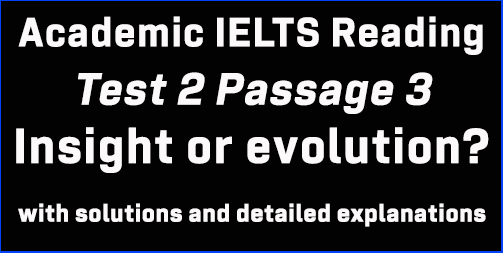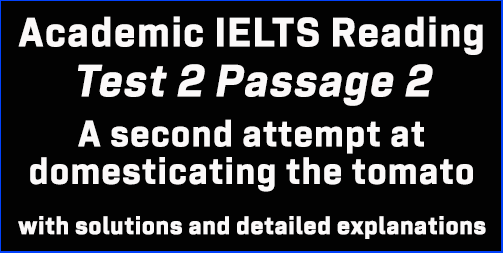IELTS Academic Reading: Cambridge 2 Test 2 Reading passage 2; text about language barrier; with best solutions and best explanations
This Academic IELTS Reading post focuses on solutions to IELTS Cambridge 2 Reading Test 2 Reading Passage 2 which is about ‘language barrier’. This is a targeted post for IELTS candidates who have big problems finding out and understanding Reading Answers in the AC module. This post can guide you the best to understand every Reading answer without much trouble. Finding out IELTS Reading answers is a steady process, and this post will assist you in this respect.
IELTS Cambridge 2 Test 2: AC Reading Module
Reading Passage 2: Questions 14-26
The topic of the passage: Language barrier
Questions 14-15: Completing sentences with NO MORE THAN THREE WORDS
In this type of question, candidates are asked to write maximum three words to complete sentences on the given topic. For this type of question, first, skim the passage to find the keywords in the paragraph concerned with the answer, and then scan to find the exact word.
[TIPS: Here scanning technique will come in handy. Target the keywords of the questions to find the answers. Remember to focus on Proper nouns, random Capital letters, numbers, special characters of text etc.]
Question no. 14: Language problems may come to the attention of the public when they have _________ such as fatal accidents or social problems.
Keywords for the question: language problems, may come to attention, public, fatal accidents, or social problems,
In paragraph no. 2 the author states in lines 1-8, “Although communication problems of this kind must happen thousands of times each day, very few become public knowledge. Publicity comes only when a failure to communicate has major consequences, such as strikes, lost orders, legal problems, or fatal accidents – even, at times, war . . .. . .”
Here, communication problems = language problems, Publicity comes = may come to the attention of the public,
strikes, lost orders, legal problems = social problems,
So, the answer is: major consequences
Question no. 15: Evidence of the extent of the language barrier has been gained from __________ of materials used by scientists such as books and periodicals.
Keywords for the question: evidence, extent of, language barrier, gained from, materials, used by scientists, books and periodicals,
In paragraph no. 3, take a look at the first lines, “Several comparable cases have been reported. But isolated examples do not give an impression of the size of the problem. .. ..”
Here, Several comparable cases = evidence of language barrier,
Then, in lines 8-13 of the same paragraph, the writer of the passage says, “ . .. .. In the English-speaking scientific world, for example, surveys of books and documents consulted in libraries and other information agencies have shown that very little foreign-language material is ever consulted.
Here, scientific world = scientists, books and documents consulted in libraries and other information agencies = materials used such as books and periodicals,
These lines suggest that the short amount of evidence of the extent of the language barrier has been gained from surveys of materials used by scientists such as books and periodicals.
So, the answer is: surveys
Question no. 16: An example of British linguistic insularity is the use of English for materials such as _________.
Keywords for the question: example, British linguistic insularity, use of English, for materials,
The answer to this question can be found in lines 3-15 in paragraph no. 4, “ . . .. . British industry, in particular, has in recent decades often been criticised for its linguistic insularity — for its assumption communicate in English, and that awareness of other languages is not therefore a priority. In the 1960s, over two-thirds of British firms dealing with non-English-speaking customers were using English for outgoing correspondence; many had their sales literature only in English; .. .. .”
So, the answer is: sales literature
Question no. 17: An example of a part of the world where people may have difficulty in negotiating English is ___________.
Keywords for the question: example, a part of the world, people, may have difficulty, negotiating English,
Lines 1-13 in paragraph no. 6 give us the answer to this question, “The changes in awareness have been most marked in English-speaking countries, where the realisation has gradually dawned that by no means everyone in the world knows English well enough to negotiate in it. This is especially a problem when English is not an official language of public administration, as in most parts of the Far East, Russia, Eastern Europe, the Arab world, Latin America and French-speaking Africa.. .. . .”
Here, especially a problem = people face difficulty in negotiating in English,
So, the answer is: Eastern Europe / Far East / Russia / Arab world / Latin America / French-speaking Africa
Questions 18-20: Multiple choice questions
[This type of question asks you to choose a suitable answer from the options using the knowledge you gained from the passage. Generally, this question is set found as the last question set in most passages so you should not worry much about it. Finding all the answers for previous questions gives you a good idea about these questions.]
Question no. 18: According to the passage, ‘They don’t talk the same language’ (paragraph 1), can refer to problems in –
Keywords for the question: ‘They don’t talk the same language’, paragraph 1, refer to problems,
The answer can be found in paragraph no. 1. The author says here in lines 9-15, “ .. .. ‘Common language’ here usually means a foreign language, but the same point applies in principle to any encounter with unfamiliar dialects or styles within a single language. ‘They don’t talk the same language’ has a major metaphorical meaning alongside its literal one., . .. .”
Here, its literal one = understanding dialect or style,
So, the answer is: C (understanding dialect or style.)
Question no. 19: The case of the poisonous mushrooms (paragraph 2) suggests that American doctors –
Keywords for the question: poisonous mushrooms, paragraph 2, American doctors,
In paragraph no. 2, lines 8-11 talks about ‘the case of the poisonous mushrooms’. Then in the final lines of the same paragraph, the writer explains, “ . .. . . Why had the American doctors not heard of it seven years later? Presumably because the report of the treatment had been published only in journals written in European languages other than English.”
These lines suggest that the American doctors did not hear of the treatment because the report of the treatment was not written in English.
So, the answer is: B (only read medical articles if they are in English.)
Question no. 20: According to the writer, the linguistic insularity of British businesses –
Keywords for the question: linguistic insularity, British businesses,
We find about ‘the linguistic insularity of British businesses’ in paragraph no. 4. Here, take a look at the final lines, “ . . … although the widespread use of English as an alternative language made them less open to the charge of insularity.”
Here, them = British businesses, less open to the charge of insularity = is not as bad now as it used to be in the past,
So, the answer is: C (is not as bad now as it used to be in the past.)
Questions 21- 24: Making List of factors with NO MORE THAN THREE WORDS
[In this question type, IELTS candidates have to make a list of factors with NO MORE THAN THREE WORDS for each answer. Candidates must find out three/four or five factors that are given in the text. Most of the time, the answers can be found in one or two paragraphs.
TIPS: Both skimming and scanning are needed for this kind of question. You need to skim the passage to find out the paragraph where the answers can be found. Then you can scan it to find all the answers. The answers can be written in any order.]
LIST the four main ways in which British companies have tried to solve the problem of the language barrier since the 1960s.
Keywords for the questions: four main ways, British companies, tried to solve, problem, language barrier, since the 1960s,
In paragraph no. 5, the writer says in lines 1-17, “The criticism and publicity given to this problem since the 1960s seems to have greatly improved the situation. Industrial training schemes have promoted an increase in linguistic and cultural awareness. Many firms now have their own translation services; to take just one example in Britain, Rowntree Mackintosh now publish their documents in six languages (English, French, German, Dutch, Italian and Xhosa). Some firms run part-time language courses in the languages of the countries with which they are most involved; some produce their own technical glossaries, to ensure consistency when material is being translated… . .”
Here, we find four solutions to the problem of language barrier which have been tried by British companies.
So, the answers are: (in any order)
(industrial) training (schemes)
translation services
(part-time) language courses
(technical) glossaries
Questions 25-26: Multiple choice questions
[This type of question asks you to choose a suitable answer from the options using the knowledge you gained from the passage. Generally, this question is set found as the last question set in most passages so you should not worry much about it. Finding all the answers for previous questions gives you a good idea about these questions.]
Question no. 25: According to the writer, English-speaking people need to be aware that –
Keywords for the question: English-speaking people, need to be aware,
The answer can be found in paragraph no. 6. Here, take a look at lines 12-16 as the writer mentions here, “ .. . . Even in cases where foreign customers can speak English quite well, it is often forgotten that they may not be able to understand it to the required level -. . ..”
Here, it is often forgotten = English-speaking people often forgets, so they need to be aware,
foreign customers = English-speaking foreigners,
may not be able to understand it to the required level = may have difficulty understanding English,
So, the answer is: D (English-speaking foreigners may have difficulty understanding English.)
Question no. 26: A suitable title for this passage would be –
Keywords for the question: suitable title, this passage,
The passage talks in detail about the problem of language barrier and provides ideas about how to solve or overcome.
So, the answer is: A (Overcoming the language barrier)
Click here for solutions to Cambridge 2 Test 2 Reading Passage 1
Click here for solutions to Cambridge 2 Test 2 Reading Passage 3




2 thoughts on “IELTS Academic Reading: Cambridge 2 Test 2 Reading passage 2; text about language barrier; with best solutions and best explanations”